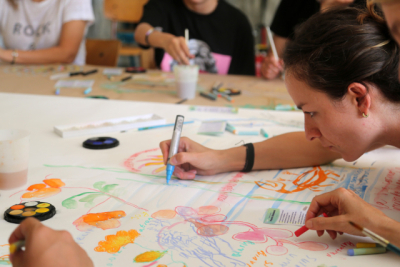More Community Economies at documenta fifteen

Community economies artists and practitioners have made an important contribution to the fifteenth edition of Documenta, the 100-day exhibition that takes place in the German city of Kassel every five years and that closes on Sunday 25 September.
Documenta fifteen was curated by the Jakarta-based collective ruangrupa who based this year’s documenta on the values and ideas of lumbung, the Indonesian word that directly translates as rice barn and is used to refer to a communal building in rural Indonesia where a community’s harvest is gathered, stored and distributed according to jointly determined criteria as a pooled resource for the future.
Lumbung Kios
Ruangrupa engaged Community Economies Institute (CEI) member Kate Rich from Feral Trade as a feral business consultant to advise on lumbung Kios, the network of decentralized and self-run Kios (Indonesian for kiosk) that were based at a number of locations in Kassel and included a network of local shop partners, and which will continue after documenta fifteen as a network of small Kios located all over the globe.
Artists participating in lumbung Kios include Sa Sa Art Projects, an artist-run initiative based in Phnom Pen, Cambodia and dedicated to experimental and critical contemporary art practices; Wajukuu Art Project, a community-based organisation established in 2004 by a group of artists in the Lunga-Lunga neighborhood of the Mukuru slum in Nairobi, Kenya; and The Question of Funding, a growing collective of cultural producers and community organisers from Palestine.
One of the Kassel-based organisations participating was Frauentreff Brückenhof a women’s meeting place that supports a vast network of local women and their families, and that featured purple crochet flowers, part of their Violets Against Violence campaign to support female victims of violence, in lumbung Kios.
Frauentreff Brückenhof was also one of the organisations involved in the The Rural School of Economics project run by Kathrin Böhm from the Community Economies Institute (CEI) and Wapke Feenstra from Myvillages, as previously reported.
Planet Abundance
CEI member Ailie Rutherford Artistic Director of the Feminist Exchange Network in Glasgow, Scotland ran Planet Abundance workshops, with Teresa Feldmann (Estonia-Netherlands) and COCO Collective (Colombia).
Planet Abundance is a series of artist led interlocal workshops to imagine a world where billionaires and current power elites have left Earth, leaving behind a world in which feminist economic principles are used to collectively organise care for planet and people.
The workshops are based on a science fiction scenario conceived by Teresa Feldmann in which the world is freed from the once dominant ethos of greed and competition and where Earthlings adopt a feminist abundance mind-set, finding new and old ways to work together in repairing their world.
Planet Abundance workshops are continuing and are being held with groups in Canada, Colombia, India, Japan and Scotland.
AFIELD Study #3
Community economies artists and practitioners were also involved in AFIELD Study #3, a co-learning program that explored alternative models of resource sharing based on collective, decentralized and sustainable values.
Community Economies Research Network (CERN) member, Caroline Woolard was a speaker for this event, and she draw on her work with Art.coop to highlight how grantmakers can play a role in transforming the cultural sector and building the solidarity economy by following the lead of BIPOC creatives who are innovating with models for self-determination and community wealth.
CERN member Binna Choi has been an adviser to AFIELD since 2018 and she also contributed to the co-learning program and reflected on how she had seen AFIELD shift away from a hierarchical grant-giving system to philanthropic model that is more decentralised and collective in its approach.
Image: Planet Abundance workshop lead by Ailie Rutherford, Teresa Feldmann and COCO Collective for Feminist Exchange Network at MAMA doc space, Documenta 15, Kassel 2022.
Jenny Cameron
